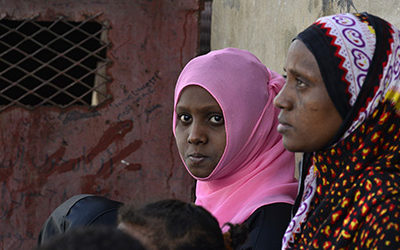Fear in Eritrea
A man recalled the day he was sent, along with his friend, to Wi’a military training camp in Eritrea. The day after he arrived, the guards sent them on a training exercise that entailed a 15 kilometre hike to collect firewood.
Eritrean refugees wait for protection and assistance, May 2014. © EPA/YAHYA ARHABOn the way back his friend became terribly ill. He continued to struggle. The guards became enraged and started to beat him until he fell to the ground. A guard said he would suffer when he reached the camp. Four people would end up carrying him back to the camp. A guard later tied him up and beat him.
“He left my friend tied up on the burning ground,” he recalled. “Soon after my friend vomited blood through his mouth and nostrils and died on the spot.”
This tragic testimony is one of 833 interviews conducted by the UN Commission of Inquiry on Human Rights in Eritrea in order to investigate gross violations of human rights in the country.
The Commission issued a new report on their findings, which stated that over the past 25 years crimes against humanity have been committed in a widespread and systematic manner in Eritrea – not on the streets of Asmara, but rather behind the walls of detention facilities and in military training camps and other places throughout the country.
Since 1991, Eritrean civilians have also been subjected to various human rights violations including enslavement, imprisonment, reprisals for the conduct of family members, discrimination on religious grounds, enforced disappearance, torture, persecution, rape and murder.
Indefinite military service
Eritreans are forced into indefinite military service subjected to horrific abuses, often being used as forced labour. This is a main driver for so many people trying to leave the country. In 2015, 47,025 Eritreans have applied for asylum in Europe.
According to a former military trainer at a military training camp at Sawa, trainers are given strict instructions to abuse their trainees. He reported a trainer who once tied up two people and left them in a tent. “He tied them up so tightly that we heard them screaming,” he said. “Later, one was dead and the other’s hands were crippled.” But, he said that if trainers don’t treat the trainees this way, they could end up in prison.
Without a trace
The Commission interviewed several Eritreans who have family members that have been arbitrarily detained or disappeared and have never been heard from again. A woman interviewed said her husband was arrested outside their home in 2009 and she has never found out what happened to him. “I searched for him, but the authorities finally told me just don’t bother coming back; there’s no point.”
A man also reported that he hasn’t seen his father since 1999 when he disappeared. “There is no law,” he said. “We couldn’t do anything. You can’t ask about someone who has disappeared. You risk being arrested yourself.”
Raped and tortured
Life in Eritrea continues to be a struggle for many women and young girls. Girls are being forced into early marriage and removed from school. Women and girls who try to flee the country are also at a bigger risk of being raped and tortured. Rape and domestic servitude in military training centres and detention centres are being ignored. A woman imprisoned for six months at a police station said she was raped every day by the officers. “After he finished, he threatened me not to say anything,” she said. “He told me that if I would report the rape he would find me wherever I go and kill me.”
No rule of law
These abuses continue without any consequences because rule of law in the country is virtually non-existent. Eritrea has no real constitution, an independent judiciary or any democratic institutions.
“There is no genuine prospect of the Eritrean judicial system holding perpetrators to account in a fair and transparent manner,” said Mike Smith, Chair of the Commission. “The perpetrators of these crimes must face justice and the victims’ voices must be heard. The international community should now take steps, including using the International Criminal Court, national courts and other available mechanisms to ensure there is accountability for the atrocities being committed in Eritrea.”






 into the crevices of life and stretch their hands screaming for help. Most of the times we ignored them because we are so taken away with our own lives.
into the crevices of life and stretch their hands screaming for help. Most of the times we ignored them because we are so taken away with our own lives.

 For Freedom of Expression 2002 - 2016 - Contact us:
For Freedom of Expression 2002 - 2016 - Contact us: